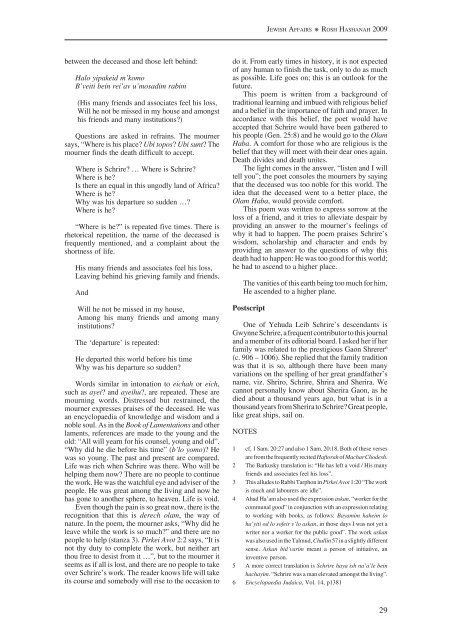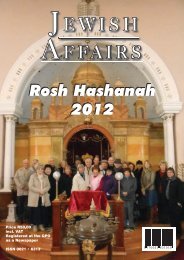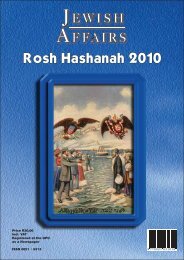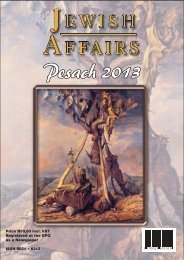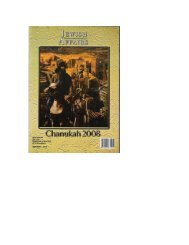Rosh Hashanah 2009 - South African Jewish Board of Deputies
Rosh Hashanah 2009 - South African Jewish Board of Deputies
Rosh Hashanah 2009 - South African Jewish Board of Deputies
- No tags were found...
Create successful ePaper yourself
Turn your PDF publications into a flip-book with our unique Google optimized e-Paper software.
JEWISH AFFAIRS ROSH HASHANAH <strong>2009</strong>between the deceased and those left behind:Halo yipakeid m’komoB’veiti bein rei’av u’mosadim rabim(His many friends and associates feel his loss,Will he not be missed in my house and amongsthis friends and many institutions?)Questions are asked in refrains. The mournersays, “Where is his place? Ubi topos? Ubi sunt? Themourner finds the death difficult to accept.Where is Schrire? … Where is Schrire?Where is he?Is there an equal in this ungodly land <strong>of</strong> Africa?Where is he?Why was his departure so sudden …?Where is he?“Where is he?” is repeated five times. There isrhetorical repetition, the name <strong>of</strong> the deceased isfrequently mentioned, and a complaint about theshortness <strong>of</strong> life.His many friends and associates feel his loss,Leaving behind his grieving family and friends.AndWill he not be missed in my house,Among his many friends and among manyinstitutions?The ‘departure’ is repeated:He departed this world before his timeWhy was his departure so sudden?Words similar in intonation to eichah or eich,such as ayei? and ayeihu?, are repeated. These aremourning words. Distressed but restrained, themourner expresses praises <strong>of</strong> the deceased. He wasan encyclopaedia <strong>of</strong> knowledge and wisdom and anoble soul. As in the Book <strong>of</strong> Lamentations and otherlaments, references are made to the young and theold: “All will yearn for his counsel, young and old”.“Why did he die before his time” (b’lo yomo)? Hewas so young. The past and present are compared.Life was rich when Schrire was there. Who will behelping them now? There are no people to continuethe work. He was the watchful eye and adviser <strong>of</strong> thepeople. He was great among the living and now hehas gone to another sphere, to heaven. Life is void.Even though the pain is so great now, there is therecognition that this is derech olam, the way <strong>of</strong>nature. In the poem, the mourner asks, “Why did heleave while the work is so much?” and there are nopeople to help (stanza 3). Pirkei Avot 2:2 says, “It isnot thy duty to complete the work, but neither artthou free to desist from it …”, but to the mourner itseems as if all is lost, and there are no people to takeover Schrire’s work. The reader knows life will takeits course and somebody will rise to the occasion todo it. From early times in history, it is not expected<strong>of</strong> any human to finish the task, only to do as muchas possible. Life goes on; this is an outlook for thefuture.This poem is written from a background <strong>of</strong>traditional learning and imbued with religious beliefand a belief in the importance <strong>of</strong> faith and prayer. Inaccordance with this belief, the poet would haveaccepted that Schrire would have been gathered tohis people (Gen. 25:8) and he would go to the OlamHaba. A comfort for those who are religious is thebelief that they will meet with their dear ones again.Death divides and death unites.The light comes in the answer, “listen and I willtell you”; the poet consoles the mourners by sayingthat the deceased was too noble for this world. Theidea that the deceased went to a better place, theOlam Haba, would provide comfort.This poem was written to express sorrow at theloss <strong>of</strong> a friend, and it tries to alleviate despair byproviding an answer to the mourner’s feelings <strong>of</strong>why it had to happen. The poem praises Schrire’swisdom, scholarship and character and ends byproviding an answer to the questions <strong>of</strong> why thisdeath had to happen: He was too good for this world;he had to ascend to a higher place.The vanities <strong>of</strong> this earth being too much for him,He ascended to a higher plane.PostscriptOne <strong>of</strong> Yehuda Leib Schrire’s descendants isGwynne Schrire, a frequent contributor to this journaland a member <strong>of</strong> its editorial board. I asked her if herfamily was related to the prestigious Gaon Shrerer 6(c. 906 – 1006). She replied that the family traditionwas that it is so, although there have been manyvariations on the spelling <strong>of</strong> her great grandfather’sname, viz. Shriro, Schrire, Shrira and Sherira. Wecannot personally know about Sherira Gaon, as hedied about a thousand years ago, but what is in athousand years from Sherira to Schrire? Great people,like great ships, sail on.NOTES1 cf, 1 Sam. 20:27 and also 1 Sam. 20:18. Both <strong>of</strong> these versesare from the frequently recited Haftorah <strong>of</strong> Machar Chodesh.2 The Barkusky translation is: “He has left a void / His manyfriends and associates feel his loss”.3 This alludes to Rabbi Tarphon in Pirkei Avot 1:20 “The workis much and labourers are idle”.4 Ahad Ha’am also used the expression askan, “worker for thecommunal good” in conjunction with an expression relatingto working with books, as follows: Bayamim haheim loha’yiti od lo s<strong>of</strong>eir v’lo askan, in those days I was not yet awriter nor a worker for the public good”. The work askanwas also used in the Talmud, Chullin 57 in a slightly differentsense. Askan bid’varim meant a person <strong>of</strong> initiative, aninventive person.5 A more correct translation is Schrire haya ish na’a’le beinhachayim. “Schrire was a man elevated amongst the living”.6 Encyclopaedia Judaica, Vol. 14, p138129


